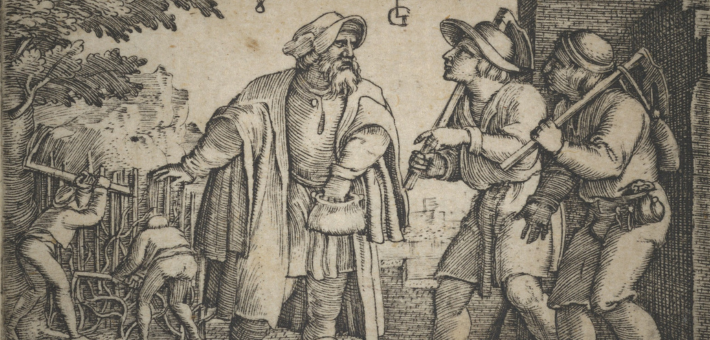Commentary on Matthew 21:23-32
Doing the will of God is more important than knowing him. In Matthew, the fundamental question is not simply whether you know God but whether you do the will of God. As Jesus taught in the Sermon on the Mount, the disciples’ urgent task is not merely to know who God is but to do what God wants them to do, which is to love all, including enemies (5:43-48).
Matthew 21:23-32 reflects this Matthean theme and focuses on God’s radical love for all people, especially the marginalized in society. To understand this text, we must start with Matthew 21:1-11, which shifts the focus of Jesus’ ministry to Jerusalem. He enters Jerusalem as a humble king riding on a donkey, receiving the ebullient crowds’ welcome. They shouted, “Hosanna to the Son of David! Blessed is the one who comes in the name of the Lord!” (21:9). He was recognized and accepted as the Messiah who would “save his people from their sins” (1:21). Before entering Jerusalem, he persistently demonstrated God’s righteousness by teaching the kingdom of God, curing the sick, and embracing the weak and marginalized. Indeed, “he taught them as one having authority and not as their scribes” (7:29). But his triumphal entry into Jerusalem faces turmoil in the city, which is an irony because the people of Jerusalem must have heard about Jesus and his reputation. They knew about him, but did not want to recognize his authority. So, they ask, “Who is this?” (21:10). Then, the crowds answered: “This is the prophet Jesus from Nazareth in Galilee” (21:11).
Then Jesus immediately entered the temple in the city, which is the heart/center of Judaism, drove out people who were selling and buying in the temple, and overturned the tables of the money changers (21:12-17). The temple is a house of prayer, not the powerhouse of politics or economics. It is neither a source of authority, nor an authority producing center. In the temple, Jesus cured the lame and the blind. But the chief priests and the scribes became angry because he disrupted their power base in the temple. After this, he goes out of the city to Bethany and meets a barren fig tree which he curses because it bore no fruits (21:18-22). This event is symbolic and refers to those who know God but do not do the will of him.
Jesus entered the temple again and taught (21:23-32). But he was confronted by the chief priests and the elders of the people who asked him: “By what authority are you doing these things, and who gave you this authority?” (21:23). It is an irony that his authority is questioned even though he does the will of God, fulfilling the righteousness of God along with John, who baptized him (3:13-17). In some sense, he is challenged because he does the will of God and cares for the poor and marginalized. But they ignore it because of fear of the loss of their power or prerogatives as leaders. They know who God is and what he wants them to do, but they do not do what they teach, as Jesus points out their problem later in 23:1-3: “Then Jesus said to the crowds and his disciples, ‘The scribes and the Pharisees sit on Moses’ seat; therefore, do whatever they teach you and follow it, but do not do as they do, for they do not practice what they teach’.”
Jesus acknowledges Jewish leaders’ good teaching in this text and knows that the chief priests and the elders are not ignorant of God or his will. So, he retorts: “I will also ask you one question; if you tell me the answer, then I will also tell you by what authority I do these things. Did the baptism of John come from heaven, or was it of human origin?” (21:24-25). Jesus presumes that they also know that John’s baptism is recognized as good work as he prepares people for repentance through water baptism. He also assumes that the crowds and other people recognize his good work in teaching the kingdom of God and helping real people. So, his point is that the issue is not authority itself, because authority is given to the one who does the work of God, but one’s not doing the will of God with authority. Jesus said earlier in the Sermon on the Mount: “Not everyone who says to me, ‘Lord, Lord,’ will enter the kingdom of heaven, but only the one who does the will of my Father in heaven. On that day many will say to me, ‘Lord, Lord, did we not prophesy in your name, cast out demons in your name, and do many mighty works in your name?’ Then I will declare to them, ‘I never knew you; go away from me, you who behave lawlessly’” (7:21-23; see also 7:24-28; 25:31-46).
To make his point further, Jesus gives the parable of the Two Sons to the leaders of the people (21:28-32). This parable is simple yet clear. A man had two sons. The father called the first son and asked him to go to work in the vineyard. He said “no” but later changed his mind and went to work. So, he called the second son because the first son said no and said the same thing. The second son said “yes” but did not go to work. The one who did the will of his father is “the first.” Knowing the father’s will without doing it is naught. The important thing is not knowledge but repentance and doing the will of God. Jesus said to them: “Truly I tell you, the tax collectors and the prostitutes are going into the kingdom of God ahead of you” because they changed their minds (21:31-32). Jesus’ point is again that what is essential in the kingdom of God is not one’s position, knowledge, or authority even if it is from God, but one’s change of mind and doing the will of God.


October 1, 2023